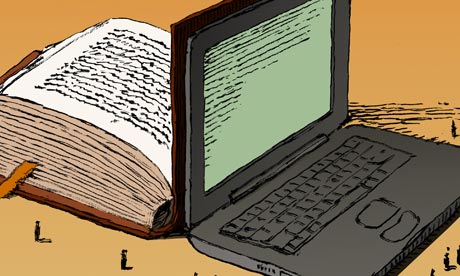The difference between ebooks and the internet is minimal, and we should be glad the two are growing closer and closer

Book and internet: can you see the join? Illustration: Images.com/Corbis
It's easy to forget that the world wide web as we know it today evolved from an early attempt to put books on the internet. When Tim Berners-Lee envisaged what would become the world wide web, it was with the idea of making academic papers and other documents widely available. To this end he devised a simple way of laying out text and images on a page, inventing what we now call Hypertext Markup Language or HTML.
Early HTML could define pages and paragraphs, bold and italicise text, embed images and lay out tables. A little more than 20 years later, HTML 5 includes media playback and animation, and the web has now become so ubiquitous that for most users it is indistinguishable from the underlying framework of the internet itself, but at its core the technology of the web remains little changed. Every web page, however sophisticated it may seem, is basically a digital book that we read on our computer through our web browser.
So when Hugh McGuire, founder of PressBooks and LibriVox, stated today that the book and the internet will merge, he was in one sense simply reiterating what is already the case. But from the perspective of people without the technical knowledge to see how closely entwined the book and the internet already are, it has the whiff of yet another doom-monger proclaiming the death of the book as we know it.
McGuire's argument hinges on the recent emergence of ebooks as a serious contender to the print book as the dominant artefact of the publishing industry, with some suggesting that ebooks will make up 50% of the book market by 2015 thanks to the Kindle, iPad and smartphones. Ebooks are deliberately packaged and marketed to appear as much like traditional print books as possible, so many readers will be surprised to discover that ebooks are built around much the same HTML structure that powers the web. Every ebook, no matter how much like a print book it may seem, is a web page that we read on the simplified browser embedded in our e-reader of choice.
Full story at The Guardian.
Early HTML could define pages and paragraphs, bold and italicise text, embed images and lay out tables. A little more than 20 years later, HTML 5 includes media playback and animation, and the web has now become so ubiquitous that for most users it is indistinguishable from the underlying framework of the internet itself, but at its core the technology of the web remains little changed. Every web page, however sophisticated it may seem, is basically a digital book that we read on our computer through our web browser.
So when Hugh McGuire, founder of PressBooks and LibriVox, stated today that the book and the internet will merge, he was in one sense simply reiterating what is already the case. But from the perspective of people without the technical knowledge to see how closely entwined the book and the internet already are, it has the whiff of yet another doom-monger proclaiming the death of the book as we know it.
McGuire's argument hinges on the recent emergence of ebooks as a serious contender to the print book as the dominant artefact of the publishing industry, with some suggesting that ebooks will make up 50% of the book market by 2015 thanks to the Kindle, iPad and smartphones. Ebooks are deliberately packaged and marketed to appear as much like traditional print books as possible, so many readers will be surprised to discover that ebooks are built around much the same HTML structure that powers the web. Every ebook, no matter how much like a print book it may seem, is a web page that we read on the simplified browser embedded in our e-reader of choice.
Full story at The Guardian.
No comments:
Post a Comment